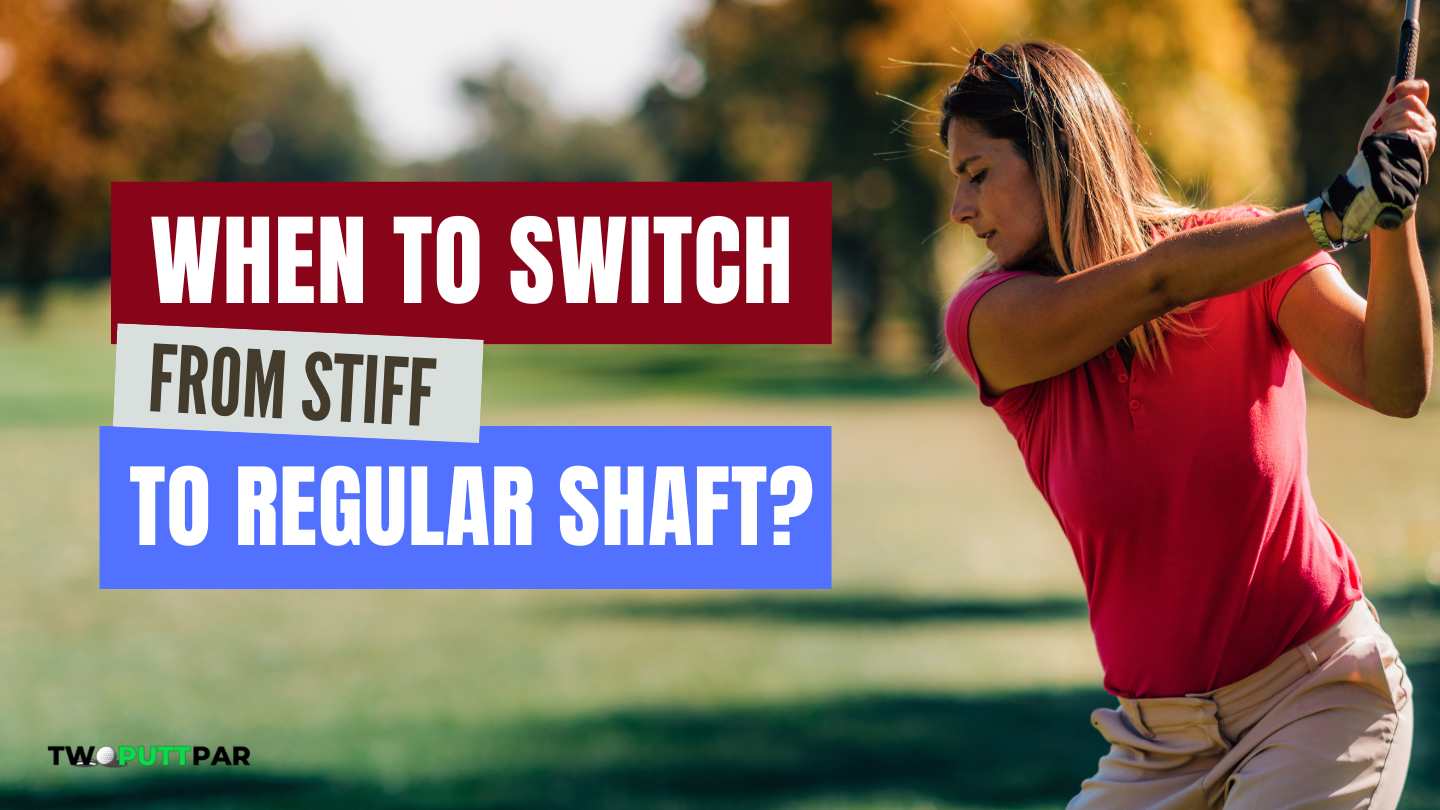
Mid-Handicap golfer who loves to share his rounds and experiences playing courses all around the UK in a hope that it will help others find those hidden gem golf courses.
I seek out golf courses that don’t get the credit they deserve and are often overlooked for the bigger more well known ones.
Are you an avid golfer who is looking to improve your game? One important factor that can greatly impact your performance on the course is using the right shaft for your golf clubs.
In this blog post, we will discuss the differences between stiff and regular shafts and provide insights on when it may be beneficial for you to make the switch.
You should consider switching from a stiff to a regular shaft when your clubhead speed decreases, typically due to age or a change in physical condition, as a regular shaft provides more flexibility and can help maximise distance.
When To Switch From Stiff To Regular Shaft
Switching from a stiff to a regular shaft in golf typically depends on your swing speed, with a general guideline suggesting that if your driver swing speed is under 90 mph, a regular shaft may be more suitable.
From the information gathered, it appears that the choice between a stiff and a regular golf shaft largely hinges on the speed of your swing.
Golfers who have a driver swing speed in the mid to upper 90s or over are often fitted with a stiff flex shaft. This is because a stiffer shaft can better handle the force of a faster swing, providing more control and accuracy.
However, if your swing speed is under 90 mph, a regular shaft could be a better choice. A less stiff shaft can help slower swingers get more distance, as the added flex allows the club to whip through at impact, launching the ball further.
The downside is that a regular shaft might lead to less control and potentially exaggerate any miss tendency in your strokes.

Thus, it’s crucial to understand your swing speed before making a decision about shaft stiffness.
If you’re unsure, it might be beneficial to get professionally fitted at a local shop, as they can provide advice tailored to your specific swing characteristics.
What Is The Difference Between a Stiff and Regular Shaft?
The primary difference between a stiff and regular shaft in golf is the degree of flexibility, which impacts the control and distance of your shots.
Flexibility
A stiff shaft is less flexible than a regular shaft.
This means it bends less during the swing. If you have a fast swing speed, a stiff shaft can offer more control over your shots, as it is less likely to twist at impact.
On the other hand, a regular shaft has more flexibility, meaning it will bend more during the swing.
Control
The stiffer the shaft, the greater the control you’ll generally have over your shot.
A stiff shaft is less prone to twisting and turning, which can lead to more accurate shots, particularly for golfers with faster swing speeds.
Conversely, a regular shaft, due to its added flexibility, might provide less control, especially if your swing speed is faster.
Distance
When it comes to distance, a regular shaft can often provide an advantage for slower swingers.
The added flex in a regular shaft allows it to store more energy during the downswing, which can be released at impact, potentially propelling the ball further.
A stiff shaft, while providing more control, may not offer the same distance benefits for slower swingers, as it cannot store and release as much energy.
Swing Speed
Your swing speed is a crucial factor in deciding between a stiff or regular shaft.
Generally, if your driver swing speed is above 90 mph, a stiff shaft would be recommended, as it can better handle the force of a faster swing. If it’s under 90 mph, a regular shaft would typically be more suitable.
When Is It Recommended To Use a Stiff Shaft?
It is recommended to use a stiff shaft when you have a faster swing speed, generally over 90 mph, as it provides greater control and accuracy.
Swing Speed
In the context of golf, swing speed refers to how fast the club head is moving at the point of impact with the ball.
If your driver swing speed is consistently over 90 mph, a stiff shaft is often suggested.
The stiffer shaft can handle the force of a faster swing, providing the golfer with more control and precision.
Control and Accuracy
A stiff shaft offers increased control and accuracy for those with a fast swing.
It is less prone to twisting and turning upon impact, leading to straighter and more predictable ball flight.
This can be particularly beneficial in windy conditions or on tight fairways where precision is paramount.
Consistent Ball Striking
For players who consistently strike the ball with the centre of the club face, a stiff shaft can provide added benefits.
Its reduced flex means there’s less chance of the club head position changing at the point of impact.
This leads to more consistent ball striking, which can improve overall shot quality and scoring potential.
Player Strength
Stronger players who generate high club head speeds may also benefit from a stiff shaft.
The greater rigidity of a stiff shaft can better withstand the forces generated by a powerful swing, ensuring the club head remains stable through impact.
What Are The Advantages of Using a Regular Flex Shaft?
The main advantages of using a regular flex shaft are increased distance for slower swingers and a smoother feel during the swing.
Increased Distance
For golfers with a slower swing speed, generally under 90 mph, a regular flex shaft can offer more distance.
The added flexibility allows the shaft to store more energy during the downswing, which is released upon impact, helping to propel the ball further.
This can be a significant advantage for those struggling to achieve desirable distances on their shots.
Smoother Feel
A regular flex shaft often provides a smoother feel during the swing.
This is because the additional flex can result in a more comfortable swinging experience, especially for golfers with slower swing speeds. It can also help to create a natural rhythm in the swing, which can lead to more consistent shot-making.
Forgiveness on Off-Centre Hits
With its added flexibility, a regular shaft can offer a bit more forgiveness on off-centre hits compared to a stiffer shaft.
This is because the extra flex can help to absorb some of the shock from a mishit, reducing the severity of the resulting shot dispersion.
Suitability for Beginners and Casual Golfers
Regular flex shafts can be particularly suitable for beginners and casual golfers who typically have slower swing speeds.
The added flex can make the game more enjoyable by providing more distance and a smoother feel during the swing.
FAQs
Q: How do I know if I need a stiff or regular flex shaft?
A: To determine whether you need a stiff or regular flex shaft, you should consider your swing speed. If your swing speed is above average (typically 90 mph or higher with a driver), a stiff shaft may be more suitable for you. If your swing speed is below average, a regular flex shaft may be a better choice. However, it’s important to note that swing speed is not the only factor to consider. Your swing tempo, ball flight, and personal preference also play a role in selecting the right shaft.
Q: Can I use a regular flex shaft if I have a fast swing speed?
A: While it is possible to use a regular flex shaft with a fast swing speed, it may not be the optimal choice. A regular flex shaft may be too flexible for a fast swing, leading to a loss of control and accuracy. It’s generally recommended for players with fast swing speeds to use a stiffer shaft to maximize their performance.
Q: Can I use a stiff flex shaft if I have a slow swing speed?
A: Using a stiff flex shaft with a slow swing speed can make it difficult to generate enough clubhead speed and may result in a loss of distance. A regular flex shaft would be a better choice for players with slower swing speeds as it helps to generate more clubhead speed and maximize distance.
Q: What are the advantages of using a stiff shaft?
A: Using a stiff shaft can provide several advantages. It offers greater control and accuracy, making it easier to consistently hit the ball where you want it to go. It can also help to reduce unwanted side spin and provide a more penetrating ball flight. Additionally, stiff shafts are often preferred by players with faster swing speeds as they can handle the increased force and power generated by their swings.
Q: Should I choose a graphite or steel shaft for my irons?
A: The choice between graphite and steel shafts for your irons depends on your swing characteristics and personal preference. Graphite shafts are lighter and can enable you to generate more clubhead speed, which may benefit players with slower swing speeds. Steel shafts, on the other hand, provide better control and are generally favored by players with faster swing speeds and a preference for a more consistent feel. It’s recommended to try both options and see which one suits your game better.
Q: Can the wrong shaft affect my golf game?
A: Yes, using the wrong shaft can have a significant impact on your golf game. If the shaft is too stiff or too flexible for your swing characteristics, it can lead to inconsistent ball striking, loss of distance, and poor shot dispersion. It’s important to choose the right shaft that suits your swing speed, tempo, and ball flight tendencies to maximize your performance on the course.
Q: How do I choose the right shaft for my golf clubs?
A: To choose the right shaft for your golf clubs, it’s recommended to consult with a professional club fitter. They will take into account your swing speed, swing tempo, ball flight tendencies, and personal preferences to recommend the appropriate shaft flex, weight, and material. A club fitting session can help you find the perfect shaft that matches your game and enhances your performance.
Conclusion
The decision to switch from a stiff to a regular shaft in golf largely depends on your swing speed, swing mechanics, and overall comfort during the swing.
If your swing speed reduces or you find that you’re struggling with control and accuracy, it might be time to consider switching to a regular shaft.
Affiliate Disclaimer – As an affiliate, we may earn a commission from qualifying purchases. We get commissions for purchases made through links on this website from Amazon and other third parties.





Leave a Reply